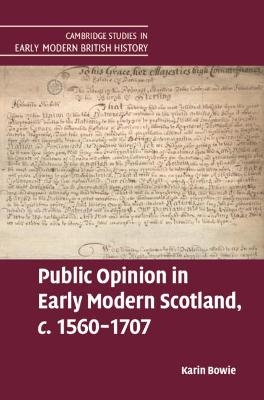
Public Opinion in Early Modern Scotland, c.1560–1707
Seiten
2020
Cambridge University Press (Verlag)
978-1-108-84347-8 (ISBN)
Cambridge University Press (Verlag)
978-1-108-84347-8 (ISBN)
Explores the dynamics of opinion politics in the era of Reformation and Anglo-Scottish union - a period of religious and constitutional tension - through protestations, petitions, oaths, oral and written modes of public communication, offering a historicised understanding of public opinion and its rise in prominence.
In early modern Scotland, religious and constitutional tensions created by Protestant reform and regal union stimulated the expression and regulation of opinion at large. Karin Bowie explores the rising prominence and changing dynamics of Scottish opinion politics in this tumultuous period. Assessing protestations, petitions, oaths, and oral and written modes of public communication, she addresses major debates on the fitness of the Habermasian model of the public sphere. This study provides a historicised understanding of early modern public opinion, investigating how the crown and its opponents sought to shape opinion at large; the forms and language in which collective opinions were represented; and the difference this made to political outcomes. Focusing on modes of persuasive communication, it reveals the reworking of traditional vehicles into powerful tools for public resistance, allowing contemporaries to recognise collective opinion outside authorised assemblies and encouraging state efforts to control seemingly dangerous opinions.
In early modern Scotland, religious and constitutional tensions created by Protestant reform and regal union stimulated the expression and regulation of opinion at large. Karin Bowie explores the rising prominence and changing dynamics of Scottish opinion politics in this tumultuous period. Assessing protestations, petitions, oaths, and oral and written modes of public communication, she addresses major debates on the fitness of the Habermasian model of the public sphere. This study provides a historicised understanding of early modern public opinion, investigating how the crown and its opponents sought to shape opinion at large; the forms and language in which collective opinions were represented; and the difference this made to political outcomes. Focusing on modes of persuasive communication, it reveals the reworking of traditional vehicles into powerful tools for public resistance, allowing contemporaries to recognise collective opinion outside authorised assemblies and encouraging state efforts to control seemingly dangerous opinions.
Karin Bowie is Senior Lecturer in the School of Humanities at the University of Glasgow and a Fellow of the Royal Historical Society where she received the David Berry prize in 2015. She is the author of Scottish Public Opinion in the Anglo-Scottish Union, 1699-1707 (2007) and articles in Scottish Affairs, Journal of British Studies, Journal of Scottish Historical Studies and the Scotsman.
1. Protestations; 2. Petitions; 3. Oaths; 4. Public communications; 5. The inclinations of the people; 6. The sense of the nation.
| Erscheinungsdatum | 15.01.2021 |
|---|---|
| Reihe/Serie | Cambridge Studies in Early Modern British History |
| Zusatzinfo | Worked examples or Exercises |
| Verlagsort | Cambridge |
| Sprache | englisch |
| Maße | 230 x 150 mm |
| Gewicht | 590 g |
| Themenwelt | Geschichte ► Allgemeine Geschichte ► Neuzeit (bis 1918) |
| Geisteswissenschaften ► Geschichte ► Regional- / Ländergeschichte | |
| Sozialwissenschaften ► Politik / Verwaltung | |
| ISBN-10 | 1-108-84347-6 / 1108843476 |
| ISBN-13 | 978-1-108-84347-8 / 9781108843478 |
| Zustand | Neuware |
| Haben Sie eine Frage zum Produkt? |
Mehr entdecken
aus dem Bereich
aus dem Bereich
Europa 1848/49 und der Kampf für eine neue Welt
Buch | Hardcover (2023)
DVA (Verlag)
48,00 €
Giordano Bruno - ein ketzerisches Leben
Buch | Hardcover (2024)
C.H.Beck (Verlag)
29,90 €


